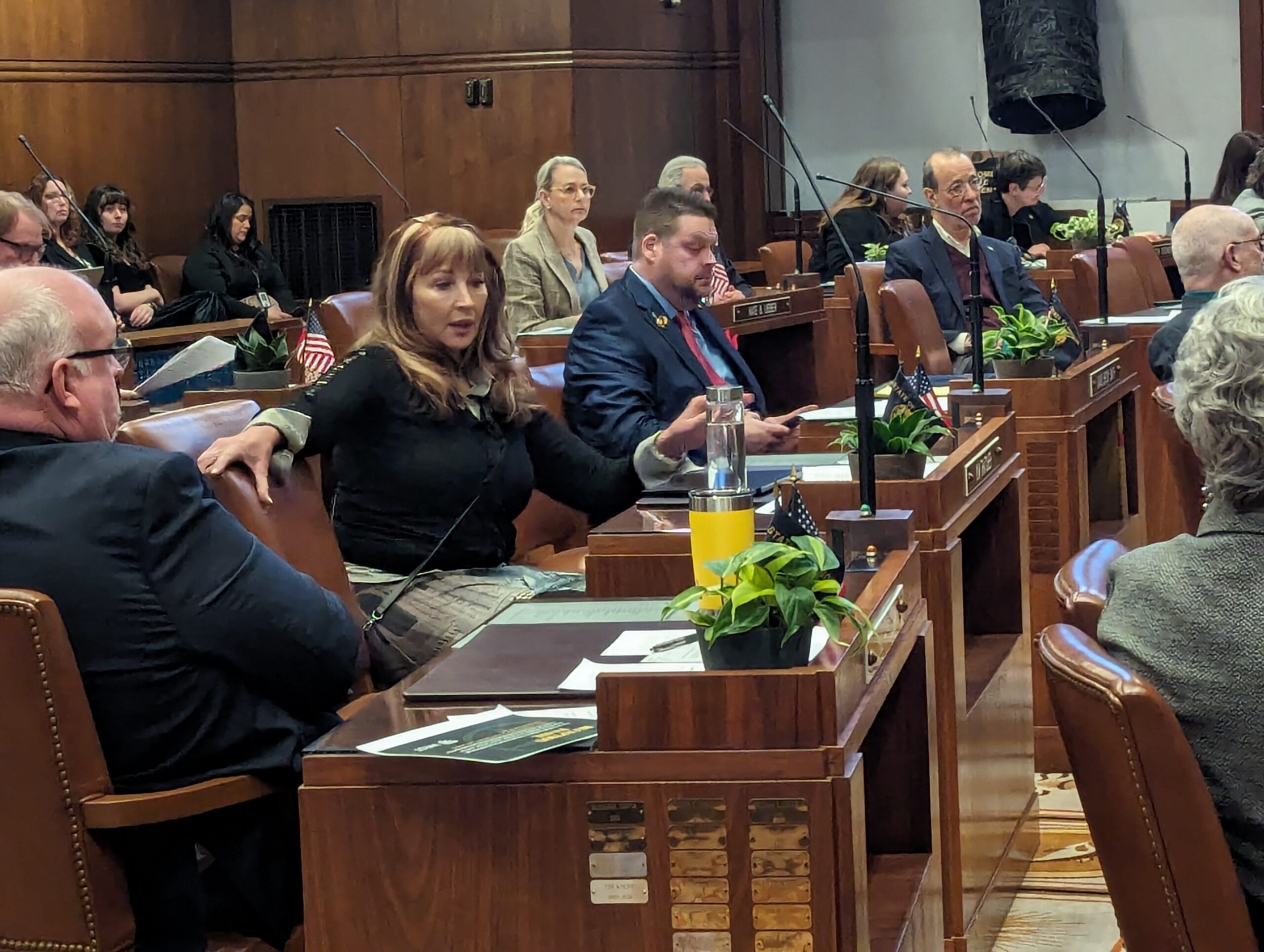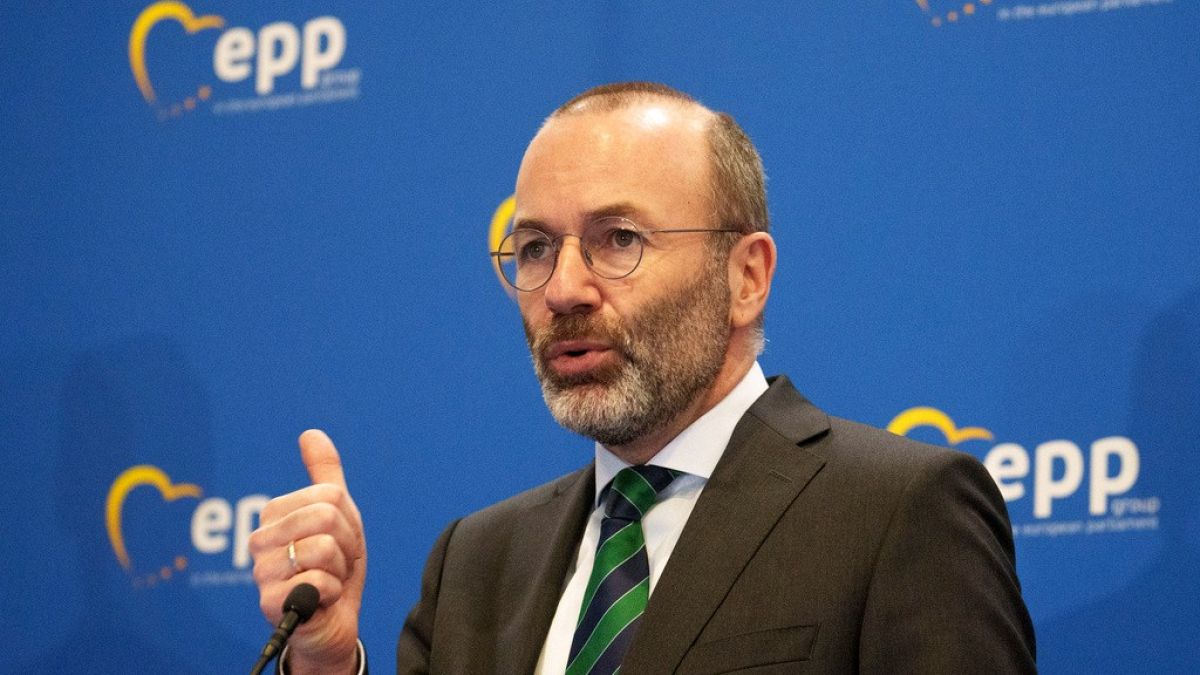Arizona
Oregon Republicans to visit Arizona-Mexico border to learn about security issues – Salem Reporter

Sixteen Republican lawmakers and legislative candidates from Oregon plan to visit the Arizona-Mexico border on Monday, arguing that lax security around the southern border exacerbates the drug crisis in Oregon, 1,000 miles north.
The group, which includes about one-third of the Republican lawmakers in the Oregon Legislature and three candidates, plans to visit Yuma, Arizona, and meet with Arizona lawmakers in Phoenix. They’ll pay for the trip with personal or campaign funds, and a spokeswoman for Senate Republicans who will join the trip plans to use vacation time to attend.
Many of the lawmakers attending the border tour signed a letter to Texas Gov. Greg Abbott earlier this year praising his standoff with the Biden administration over border issues. Abbott has put up razor wire on the border, bused tens of thousands of undocumented migrants to Democratic cities far from the border and blocked U.S. Border Patrol agents from accessing some land.
Sen. Tim Knopp, R-Bend, said the Oregon lawmakers’ letter to Abbott led to more connections with their colleagues in Arizona and Texas, resulting in an invitation to visit the border in Arizona. Despite Oregon’s distance from the southern border, he said Oregonians should be concerned about illegal immigration and drug smuggling.
“We know that there are drugs coming over the border, and those end up in probably all states, but certainly in the western states,” he said. “We’ve obviously seen some crime impact from people who have come in illegally. I think all of us want legal immigration, and recognize the need, but we also want to know who’s in the country and right now, we don’t, and that there’s significant danger there.”
Crime and immigration have been increasingly linked in Republican rhetoric, but researchers say immigrants of all sorts are less likely to commit crimes than American-born residents. Federal law enforcement reports that, while the southern border is a significant drug smuggling route, most of the drugs are brought by “highly organized and compartmentalized” Mexican organized crime groups, not immigrants and asylum seekers.
Knopp, who led Senate Republicans’ six-week 2023 walkout over abortion and transgender health care legislation, can’t return to the Legislature next year because voters approved a constitutional amendment barring lawmakers who miss 10 or more days of floor sessions from reelection. He said he expects Oregon Republicans to introduce bills related to border security, immigration and crime – though what effect they could have when the federal government controls immigration policy and Democrats control Oregon’s legislative and executive branches remains to be seen.
The Oregon Republicans will participate in a tour of the border in Yuma led by Jonathan Lines, a Yuma County supervisor and former chairman of the Arizona Republican Party.
His itinerary for the Oregon Republicans includes walking along the border itself and seeing the different barriers erected on the orders of past administrations. He’ll also take the visitors to meet with nongovernmental organizations and groups in Yuma, including visiting a local hospital and food bank. They’ll meet with leaders from Amberly’s Place, a local child welfare center and hear from former Arizona Democratic state Sen. Amanda Aguirre, who leads the Regional Center for Border Health.
“For many people, this is not real,” he said. “They see images.”
Who’s going to the border?
Sen. Tim Knopp, R-Bend
Sen. Fred Girod, R-Silverton
Rep. Vikki Breese-Iverson, R-Prineville
Sen. David Brock Smith, R-Port Orford
Sen. Kim Thatcher, R-Keizer
Rep. Greg Smith, R-Heppner
Rep. Court Boice, R-Gold Beach
Rep. Virgle Osborne, R-Roseburg
Rep. Boomer Wright, R-Coos Bay
Rep. Lucetta Elmer, R-McMinnville
Rep. Christine Goodwin, R-Canyonville
Rep. Dwayne Yunker, R-Grants Pass
Bruce Starr, Senate candidate from Dundee
Michael Summers, Senate candidate from Redmond
Keri Lopez, House candidate from Redmond
Lines told the Capital Chronicle he has fielded many requests from elected officials and candidates – most of them Republicans, though Democrat-turned-independent candidate for president Robert F. Kennedy Jr. participated in one – to tour the border. Some come just to get campaign photos and videos and others are there to learn, he said, but he shares the same information with both groups.
Rep. Greg Smith, R-Heppner, said he’s joining the trip because he wants to hear from Arizonans about how Oregon can help “try and keep the bad guys out while allowing legal immigration to occur.” He hears frequently from voters about border concerns, and he’s trying to figure out the connection between the southern border and the limited authority held by lawmakers in Salem.
“What I do know is we’ve heard testimony at the Capitol about drug cartels,” he said. “In my small little town of Milton-Freewater, I’ve got Highway 11, and four months ago in December, I had over 200 people in a room, asking me,the state police and ODOT to create a safety corridor because they were concerned about drug cartels driving through and human trafficking cartels coming through.”
Smith said he also hopes to meet with Arizona lawmakers, both Republicans and Democrats, to deliver an Oregon flag and discuss issues that matter to them. Sen. David Brock Smith, R-Port Orford and no relation, also hopes to double-dip on the trip by connecting with Arizona lawmakers: He wants to build a coalition of western legislators who can work together on fire policy and exert pressure on Congress to provide resources to prevent and respond to the infernos that blaze across the Western U.S. each year.
He said illegal drugs, many of which law enforcement suspects make it across the southern border, are a top concern in his southern Oregon district.
“There’s basically three ways to get drugs to Portland and two of them, two of those highways come through my district,” Brock Smith said.
Earlier this month, for instance Oregon State Police reported that they stopped a Phoenix man driving north of Roseburg with 62 pounds of methamphetamine and 22,000 fentanyl-laced pills that police said the man was taking to Portland.
Democrats panned the visit as a campaign stunt. Hannah Howell, executive director of the House Democrats’ campaign arm, FuturePAC, said Democrats are staying in Oregon to fix Oregon’s problems and Republicans are welcome to join them.
“It’s honestly baffling,” Howell said. “While Oregonians are worried about rising prices and safety and homelessness, Republicans are inventing a reason to bring divisive national problems – that they don’t even know how to solve – to our state.”
Howell’s counterpart at the Senate Democratic Leadership Fund, Oliver Muggli, added “Oregonians expect their elected officials to be focused on our people in our state, not playing MAGA politics a thousand miles away. This is a cheap election-year stunt that does nothing except show how deeply out-of-touch Republican politicians are with Oregon priorities.”
Oregon Capital Chronicle is part of States Newsroom, a nonprofit network of news bureaus supported by grants and a coalition of donors. Oregon Capital Chronicle maintains editorial independence. Contact [email protected]
STORY TIP OR IDEA? Send an email to Salem Reporter’s news team: [email protected].
SUPPORT OUR WORK – We depend on subscribers for resources to report on Salem with care and depth, fairness and accuracy. Subscribe today to get our daily newsletters and more. Click I want to subscribe!
Julia Shumway is deputy editor of Oregon Capital Chronicle and has reported on government and politics in Iowa and Nebraska, spent time at the Bend Bulletin and most recently was a legislative reporter for the Arizona Capitol Times in Phoenix. An award-winning journalist, Julia most recently reported on the tangled efforts to audit the presidential results in Arizona.

Arizona
Indigenous advocates work to combat fake sober living homes in Arizona

Jade Lara was five months pregnant in January 2022 when she arrived at a group home in San Tan Valley with the promise of daily classes and group therapy to help her with sobriety. However, when she arrived, she was met with a lack of assistance and care and provided with only one therapy session a week held at a different center.
Lara noted the men in the co-ed home were given the freedom to “come and go,” often coming back clearly intoxicated. The situation turned dangerous the night she was sent to another center in Maricopa County, where an intoxicated man wouldn’t leave her or the other woman in the house alone.
“I was just like, no, this is enough,” Lara said. “I got my bag and then I used the last of my money that I had to get an Uber out of there because I was like, ‘I don’t trust this place.’”
GET THE MORNING HEADLINES DELIVERED TO YOUR INBOX
Lara was in the second center for a week before she left, walking the streets of Phoenix before a friend connected her with a reputable sober living home.
Lara, who is Navajo, is one of thousands of individuals who have fallen victim to a Medicaid scheme primarily affecting Indigenous communities. After legislation tackling the problem failed to pass this session, individuals are taking the issue into their own hands to protect vulnerable members of the community.
Goodyear Police Officer Scott Daniel, who serves on the city’s crisis intervention team, told lawmakers in February that he has seen many similar instances at group homes in the Valley.
“Noncompliant sober living homes are a growing concern within our cities and have been since 2019,” he said at an Arizona Senate Health and Human Services Committee meeting. “I myself have gone on numerous occasions and witnessed various issues with people coming out. We find them passed out in front of their homes and neighboring homes and backyards. There’s no one around, and if there is, there’s only one person … who is clearly not a behavioral specialist, or any type of specialist.”
Nearly a year after Gov. Katie Hobbs and Attorney General Kris Mayes announced a crackdown on a Medicaid scheme exploiting vulnerable Indigenous individuals, residents of tribal communities across the state are still calling on lawmakers to combat the issue.
The scam has involved unlicensed centers in Arizona that target individuals in tribal communities who are dealing with substance abuse or struggling with mental illness and lure them in with false promises of assistance at rehab centers or sober living centers. Officials say this scheme has cost the state an estimated $2.8 billion, according to 12 News.
Scammers exploit the Arizona Health Care Cost Containment System (AHCCCS) by creating pop-up centers across the Valley that take advantage of the American Indian Health Program and collecting thousands of dollars a day in federal funds for bogus or shoddy services.
The Arizona Department of Health Service’s annual sober living report substantiates the magnitude of the problem, lawmakers say. From 2021 to 2023, the issuance of new sober living licenses surged from 52 to 470, while complaints soared from 94 to 446 – an increase of over 370%. Moreover, enforcement actions against licensed homes by the department skyrocketed from 97 to over 2,000 during the same period.
How advocates are working to protect the Indigenous community
Reva Stewart, a Navajo activist who has been working to locate missing community members and bring this issue to the attention of authorities, describes her efforts as a “full-time second job.”
Stewart is the founder of Stolen People, Stolen Benefits, a grassroots organization focused on raising awareness of the issue and bringing victims home. With the assistance of fellow advocate Coleen Chatter, Stewart has tracked down numerous individuals and raised over $10,000 to pay for food and bus tickets to get them home to their families after leaving fraudulent rehab centers.
Stewart’s involvement in the issue came after her cousin was picked up by an unmarked van in Farmington, New Mexico.
“She told me that they had picked her up in Farmington and they had picked up four people all at the same time. And on the way down, they told her … whatever they could to convince her that they were just going for a day trip,” Stewart said. “So she got in and they bought alcohol for them. She said they just pretty much kept them intoxicated all the way down.”
Upon arriving at a group home in Phoenix, her cousin was told to sign up for AHCCCS benefits, but when she refused to provide personal information, she was forced to leave with no way of getting back to New Mexico.
According to Stewart, this is a common mark of the scam – targeted individuals are often found on the street or at bus stops, flea markets and medical centers. They are picked up in SUVs or unmarked vans and left with no means to get back to their homes.
Stewart said she believes Native communities are being targeted because of their high missing and murdered population.
“They see that they’re homeless and they’ve got alcohol problems, and with our huge, huge missing and murdered Indigenous women, people, families, everything, (they think) that we’re not going to find them. They think that they don’t have families behind them and that if they’re unsheltered on the reservation, nobody cares,” Stewart said.
According to a 2021 report by the state health department, Native Americans are 500% more likely to experience alcohol-induced deaths and have a 20% higher likelihood of dying from drug-induced deaths than the average Arizonan.
Mandy Hagen, who started working with advocates to address the issue in October 2022, has heard of numerous instances of abuse in behavioral health facilities.
“I have seen both men and women being verbally and physically abused by their quote-unquote ‘clinicians.’ There’s lots of abusive behavior,” Hagen said. “They’re almost kind of treated like, ‘We’re giving you a free place to stay and we’re giving you all these things, so, therefore, we can treat you any way we want to.’”
To aid in finding missing individuals, Hagen contacts treatment centers suspected of holding them and requests that they facilitate communication between the person and their loved ones.
“Obviously (because of) HIPAA, they can’t tell me if they’re there,” Hagen said, referring to the federal law that assures the privacy of a person’s medical information. “But I’ll just reach out to my contact and say, ‘Hey, this person has been reported missing. They were last seen or heard from at your facility. Can you just please have them reach out to their family?’”
Lucrecia Belmont, a Minnesota retiree, reached out to Stewart after seeing a post about the scam. She now works closely with advocates to track down locations of supposed homes, using a public database to find the center’s National Provider Identifier numbers, which are identification numbers given to covered and licensed health care providers.
Though these online databases are free to use, many do not know how to access or navigate the technology, Belmont said.
“I think if more people kind of understood just the basics of how to do some of these searches, general community members would be able to do a lot more watching out for each other,” Belmont said. “A big component of it has got to be the community really networking some solidarity and protection for each other, and that’s something we’re working on.”
Getting lawmakers involved
Arizona Sen. Theresa Hatathlie, D-Tuba City, who is a member of the Navajo Nation, recently sponsored a bill aiming to regulate fraudulent sober living homes, but the legislation failed to pass in the House.
“I can count on both of my hands, my fingers and my toes the number of people who have died in this type of facility,” Hatathlie said during a Senate Health and Human Services Committee meeting in February. “To make sure that they’re going to be held accountable and to make sure that the families will be able to take their loved one home, I think, is not too big of an ask.”
During hearings for the legislation, Hatathlie stressed the importance of state agencies – such as the health department, the attorney general and the Arizona Corporation Commission – working together to tackle the issue, and said that a lack of communication between departments has allowed for the scam to continue.
“These criminals, their licenses are being suspended. They’re being revoked. They (departments) are not communicating it to ACC,” she said. “So these criminals, they go … and they buy more licenses. In a few hours in between or even in a day, they come out with 20 to 50 licenses, and they just move shop to the next community, to the next neighborhood and they continue to commit crime. That’s why it’s very important that we address this in a comprehensive fashion.”
The primary opposition to the bill came in the form of licensed behavioral health facilities that argued that the legislation imposed excessive restrictions beyond targeting scam centers.
“The intent of the bill is well-founded, but my concern is more the unintended effect on other facilities,” lobbyist Don Isaacson said. “In many cases, it’s directed not just at sober living or at behavioral health facilities that operated poorly, but it hits every residential care facility.”
Another less expansive bill aimed at the scheme, sponsored by Sen. Frank Carroll, R-Sun City West, failed to receive a third hearing before the legislative deadline. It would have increased regulations and fines for unlicensed homes and mandated on-site inspections.
AHCCCS has made changes in its system in an attempt to fight the scheme. The agency extended a moratorium for enrolling new behavioral health clinics for Medicaid billing until June 8. It also instituted tighter controls for sober-living facilities, including requirements for fingerprint clearance background checks and site visits for certain types of behavioral health facilities.
Currently, advocates are focusing their efforts on spreading advice on how to stay safe and avoid the scheme. They warn that if an individual approaches offering assistance, they are likely tied to an unethical treatment center, as reputable treatment centers do not send drivers to recruit people on the street.
According to Hagen, the best way to receive reputable help is to get connected to licensed, ethical care providers through social workers, case managers, primary care clinics or resource centers.
“If you think that you have a substance-use issue, instead of going directly with somebody who’s offering you free housing, go to your behavioral health services,” Hagen said. “A lot of the tribes have behavioral health services. Whether it’s an actual behavioral health services building, a hospital or detox, I would go and talk to somebody that can refer you appropriately.”
Arizona
Arizona woman who poisoned Air Force husband’s coffee with bleach dodges jail

An Arizona woman who admitted to poisoning her Air Force husband by pouring bleach into his coffee is reportedly avoiding jail time.
Melody Felicano Johnson, 40, pleaded guilty last month to two counts of poisoning food or drink for putting trace amounts of bleach into husband Roby Johnson’s coffee maker on July 11 and July 18, 2023, Arizona’s 13 News reported.
Johnson was sentenced to a probation sentence that includes mandatory mental health treatment that goes into effect immediately, and she is not allowed to have contact with her husband unless a legal team is present.
Roby Johnson said he believed his wife was trying to kill him to collect death benefits, according to court documents.
She was initially arrested and charged with attempted first-degree murder, aggravated assault and adding harmful substances to food, drink or medicine but agreed to a plea deal instead.
The couple have a child together and were going through a divorce during the times she tried to poison her husband, court documents show.
Roby began to notice his coffee tasted odd while he was drinking a cup in March 2023 when the family was stationed in Germany.
He drank the coffee for two or three weeks before purchasing pool testing strips to determine what was wrong with it.
First, he tested the tap water, which came back normal, but after conducting the test on his coffee, he discovered the drink contained high levels of chlorine.
He stated she knew that he would prep his coffee pot to be ready at night so that in the morning he just needed to turn it on to make his coffee.
Roby pretended to drink the coffee while stationed in Germany and waited until the family moved back to Tucson, Arizona, last summer to alert authorities because he did not want to report his findings in Europe, the court documents state.

When the family returned to the US in late June, Roby set up a camera inside their temporary housing near Davis Monthan Air Force Base to observe his wife’s behavior – and the camera allegedly captured Melody pouring bleach into his coffee.
On July 6, he filed a report with the Tucson Police Department, but police did not follow up because the video did not clearly show what liquid his wife was pouring into his drink, prompting Roby to set up a second camera disguised as a fire alarm.
Roby returned to the police department on July 18 to provide additional video evidence, and the new footage allegedly showed his wife pouring bleach into the coffee machine before brewing. Johnson was then detained.
Arizona
Arizona boy, his mom are raising money for a wheelchair accessible van

A Valley fifth grader is fighting a tough battle.
First, he had trouble walking. Now, he’s a person who uses a wheelchair.
He and his mom are raising money to make his life more accessible.
For now, it’s challenging, and potentially dangerous, every time Cole tries to get in and out of the car.
“He will say he is OK, and I can see his legs shaking. That’s one thing that really moves me, is he has a strong will to keep moving,” said Crysta Hough, Cole’s mom.
Crysta says three years ago, her son’s leg had a pain. They learned he had Duchenne muscular dystrophy.
“It’s a genetic disorder that attacks his muscles, legs and lower extremities,” she said.
They got him a powered wheelchair. It stretches his core and his legs, but getting it in and out is hard.
Something that brings Cole joy is going to school.
“It’s fun to learn about new things,” Cole said.
But, going to school becomes harder every day.
“We are coping with our day-to-day lives as much as we can,” his mom said.
Arizona boy raising money for wheelchair accessible van
This year, they were picked by the Jett Foundation to raise funds for a wheelchair accessible van.
They’re expensive.
If Cole raises half the money, the foundation picks up the rest and gifts the van.
So far, they’ve raised $12,000. They need $32,000.
“It would be a blessing. It would be the biggest thing, the biggest accomplishment for him,” Crysta said.
Header here
“It’s really not a want for these families,” Alexa Tinsley with Jett Foundation said. “It’s an absolute need.”
It can be life changing.
“Access medical care, access doctor appointments, and then also, you know, do things as a family and get children and adults out of the house as well,” Tinsley said.
Coal has goals he wants to achieve, and a van would make them possible.
“I want to help him achieve his goals, but like I said, with public transportation, that’s not always the case,” Crysta said.
The young boy says it would change everything if they had a van.
“I would be able to do after-school stuff and before-school stuff easier. All of that would make it so much easier,” he said.
-

 World1 week ago
World1 week agoBrussels, my love? Champage cracked open to celebrate the Big Bang
-

 Politics1 week ago
Politics1 week agoAustralian lawmakers send letter urging Biden to drop case against Julian Assange on World Press Freedom Day
-

 Education1 week ago
Education1 week agoHow Counterprotesters at U.C.L.A. Provoked Violence, Unchecked for Hours
-
News1 week ago
A group of Republicans has united to defend the legitimacy of US elections and those who run them
-

 Politics1 week ago
Politics1 week agoHouse Dems seeking re-election seemingly reverse course, call on Biden to 'bring order to the southern border'
-

 World1 week ago
World1 week ago‘It’s going to be worse’: Brazil braces for more pain amid record flooding
-

 Politics1 week ago
Politics1 week ago'Stop the invasion': Migrant flights in battleground state ignite bipartisan backlash from lawmakers
-

 World1 week ago
World1 week agoGerman socialist candidate attacked before EU elections














